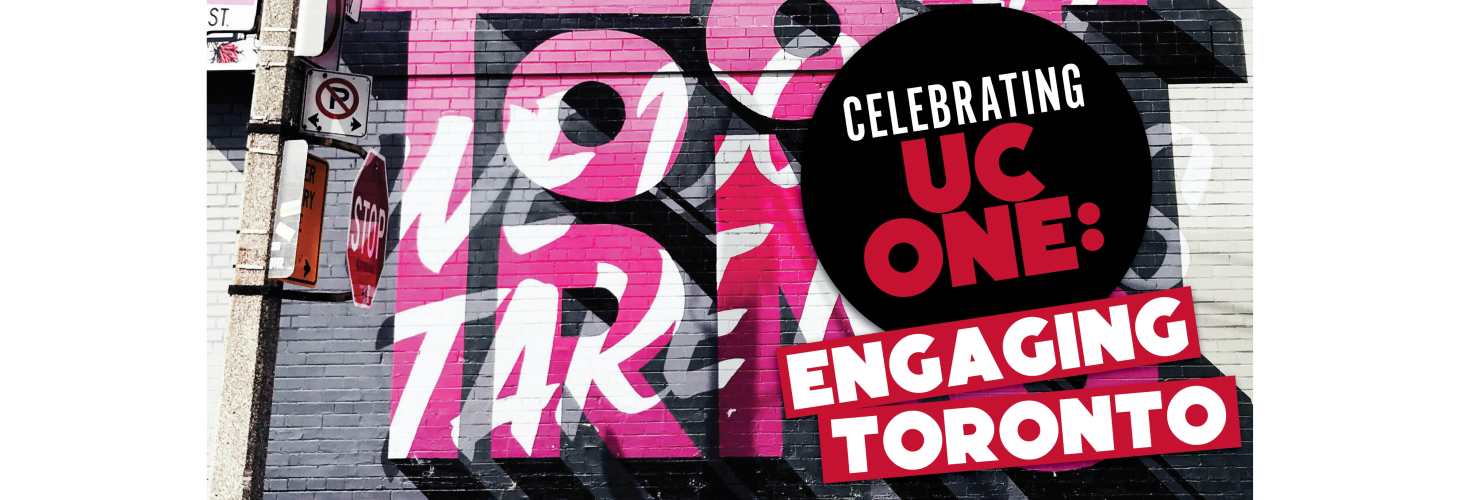
Celebrating UC One
UC One: Big City, Small Classes
By Elaine Smith
The University of Toronto’s One programs first appeared on the scene more than a decade ago, offering first-year students the opportunity to take a small seminar course that allowed them to form personal connections with the professor and their classmates and preventing them from feeling alone on a large, urban campus.
Since their inception, One courses have taken off, with each college at U of T offering its own version. The UC One program, Engaging the City, began at University College in 2013 and has become a hit with students, thanks to the personal engagement it allows, the topics it offers and the strength of its faculty. In fact, UC One is currently celebrating one of its outstanding instructors, Shawn Micallef, who earned the 2021 Faculty of Arts & Science's Superior Teaching Award for his work with Citizenship in the Canadian City.
“My UC One course, helped me find my community and my place at the university and helped solidify my interests,” says Marienka Bishop-Kovac, a master’s degree student in planning at Ryerson University who took the UC One course Citizenship in the Canadian City while earning her BA from the John H. Daniels Faculty of Architecture, Landscape and Design. “It helped 100 per cent being in a small group; first year can be pretty overwhelming when you’re used to intimate high school classes with the same people.”
Emily Gilbert, UC vice-principal, says the College’s UC One program dovetails nicely with President Meric Gertler’s priority of leveraging U of T’s urban location. All of its offerings provide different ways of connecting to the city, whether through civics, performance, sexuality or health, all topic related to programs with UC connections.
“One of our objectives is to have our students engage with the city of Toronto so they can see how what they learn in class relates to the place where they live,” Gilbert says. “It also brings the research we do at the university into a broader social and political context. In addition, we want the students to think about how they might engage with the world beyond their undergraduate studies.”
Nor is a UC One course a siloed experience. All of the UC One classes come together a few times each term for plenary sessions and guest speakers and every student is paired with someone from another UC One stream for a joint assignment, helping them building additional connections.
Citizenship in Focus
Citizenship in the Canadian City exemplifies the strengths of UC One courses. Micallef was a guest speaker during the course’s first year and Gilbert recruited him to take over the class the following year. Micallef, who writes about urban issues for the Toronto Star and other publications, sees the class as a “fun opportunity to use the GTA as a lab to teach civics.”
“I want the students to see how they can be involved with their city and understand how it works,” Micallef says. “We’re in the centre of a municipal democracy that’s messy and argumentative and it’s a living thing that is happening in front of us. It makes you a better citizen, theoretically, to see that all of this is happening in your own backyard.”
Micallef has created a syllabus, but he’s not insistent on adhering to it rigidly. If there is something relevant in the news, he’s happy to incorporate it into a class session, and COVID-19 has been a major focus during the past year. Micallef also incorporates experiential education opportunities into the classes. He takes the students on field trips to experience various aspects of the city, such as a guided walk through Toronto’s ravines with an arborist and a visit to Toronto City Hall to see municipal government at work. (This year’s field trips, of course, were done virtually.)
“It’s like having a private tour of the city from some of Toronto’s best flâneurs,” says Bishop-Kovac.
In addition, Micallef brings guest speakers to class to illuminate various aspects of city life: people such as street nurse Cathy Crowe, journalist Fatima Syed, urban planner Cheryl Case and street artist Pascal Paquette.
“Shawn is so well-connected that he can always draw on a great roster of people to address our plenaries and be guest speakers for his course,” says Gilbert. “For instance, all the UC One students heard Toronto Star reporter Jennifer Yang talk about her work on the COVID-19 beat and about covering Ebola and other global health issues.
“He wants the students to see themselves not only as learners, but as potential changemakers, too.”
Valuable Skills
Each UC One student works on a group research project during the term and the classes come together for an end-of-term poster session to present their work. It helps students engage with the public and think about new ways to disseminate their work.
“This encourages the students to work collaboratively and to speak to issues in a way that speaks to others,” Gilbert says. “We see some amazing projects. For example, our health stream had a number of projects about the pandemic and how various demographics were negatively affected, and our sexuality stream had projects about the gentrification of Church Street and about the history of bathhouse raids in Toronto.”
In addition to enhancing their skills in research, presentation and collaboration, Gilbert says UC One builds students’ analytical skills.
“Critical thinking is valuable no matter what course of study you pursue,” she says. “Students can use the skills they develop here in their field of study or outside class, too. They see that the university is not simply a cloistered setting.”
The last word on the program goes to Bishop-Kovac.
“I’m really grateful that I took a UC One course,” says the future planner and homegrown Torontonian. “It reinvigorated my interest in Toronto.”